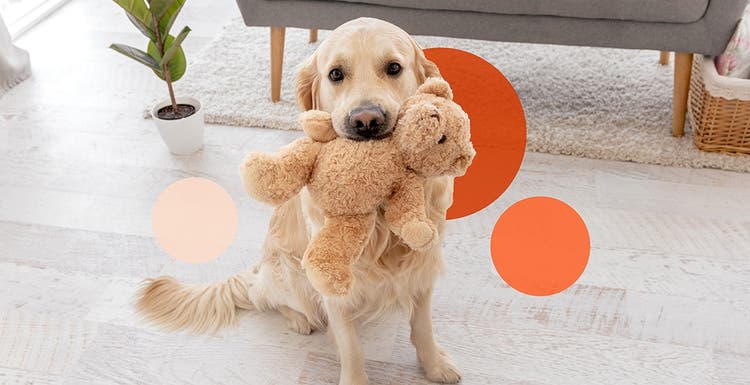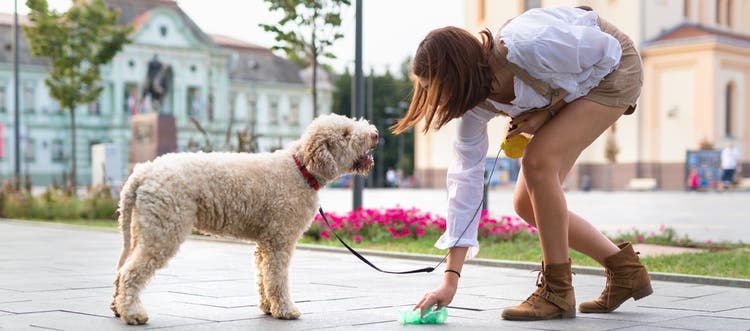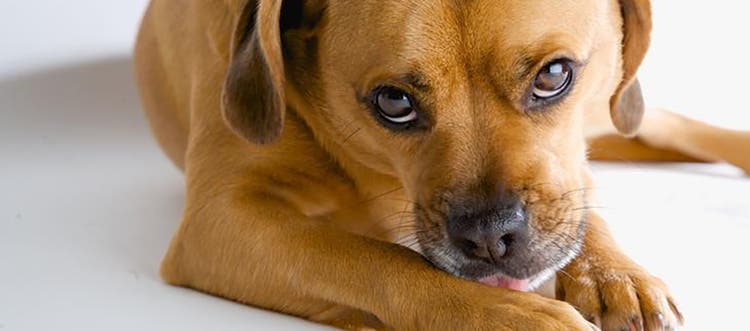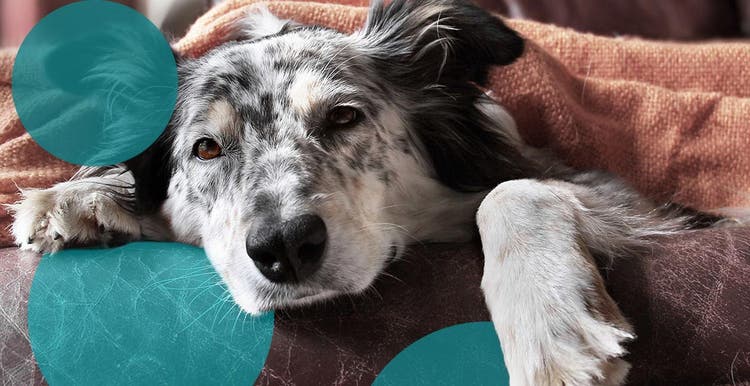Learn why dogs engage in coprophagia — eating their own poop — and what you can do to curb the behavior.
If you’re reading this article, it’s likely you have a dog that eats their own poop. While this behavior is obviously not desirable, the good news is that it’s a common and preventable behavior. Lots of dogs eat their own poop, which is technically called coprophagia. There are several reasons a dog might exhibit this behavior.
Why Do Dogs Eat Their Own Poop?
Coprophagia can typically be linked to either a behavioral or medical issue. If you notice your dog is suddenly eating poop, take them to the veterinarian for a checkup to rule out any medical causes, such as:
- Lack of a digestive enzyme
- Parasites
- Malabsorption
- Nutrient-deficient diet
- Underfeeding
Your dog could also be eating their own poop due to a behavioral problem, such as:
- Imitation: If you add a new dog to your family and your current dog eats their own poop, the new dog could mimic the behavior.
- Ingrained behavior: Nursing mothers sometimes will eat stool to keep the area clean for their puppies.
- Stress or boredom: If your dog is left at home all day, they may form a habit of eating their poop. If you aren’t home during the day, make sure your pet has the opportunity to get some midday exercise with a dog walker.
- Scavenger instinct: It sounds disgusting to us, but for dogs, poop is just one more interesting thing they can scavenge and put in their mouths.
- Attention-seeking behavior: If your dog isn’t getting enough attention, they might take extreme measures — like eating their poop — in an effort to draw you back to them.
How Can I Stop My Dog from Eating Their Poop?
If you suspect, or if your vet has confirmed, that your dog is eating poop because of a medical reason, talk with your vet about the steps you can take to prevent future incidents.
If your dog’s coprophagia is related to a behavioral trigger, you’ll probably need to take an active role in helping them break the habit. Here are a few interventions to try:
- Scoop the poop: When you’re home and with your pet, be sure to pick up feces right away after your dog defecates.
- Don’t forget your cat: If you have a cat, keep their litter box clean and try to keep your dog from sniffing or digging in the box.
- Provide a well-balanced diet: Food additives that claim to make your dog’s poop taste bad are a popular option. It’s better to simply feed your dog a vet-recommended diet.
- Keep your dog busy: Whether you’re home or away, puzzle toys are a great way to give your dog mental exercise, and walking or playing with your dog daily will help them expend excess energy.
- Practice positive reinforcement: Train your dog to “leave it” or “come” after they have eliminated, and reward them with a treat to develop a healthy habit.
Should I Worry If My Dog Eats Poop?
Besides the ick factor, dogs that eat poop are at risk of contracting gastrointestinal worms or experiencing an upset stomach. And, as stated above, coprophagia in dogs could also point to an underlying medical issue. Whether behavioral or medical in nature, this issue also disrupts the pet-human bond. No owner wants a lick from a dog that has eaten poop!
With all these factors in mind, don’t get too upset if you see your dog eating their poop. Redirect them away from it, pick it up and move on. If you make a big deal out of it, your dog is more likely to continue eating poop. Check in with your vet if you have lingering concerns about your dog’s poop-eating habits.
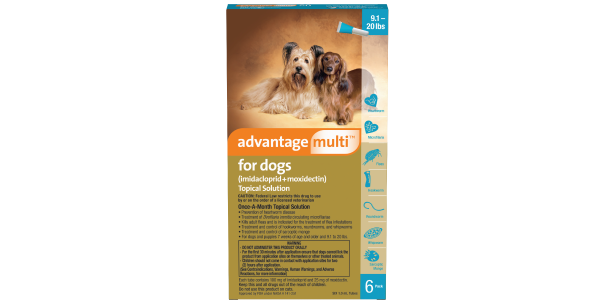
Advantage Multi® for Dogs (imidacloprid + moxidectin)
WARNING: DO NOT ADMINISTER THIS PRODUCT ORALLY. For the first 30 minutes after application ensure that dogs cannot lick the product from application sites on themselves or other treated animals. Children should not come in contact with the application sites for two (2) hours after application. (See Contraindications, Warnings, Human Warnings, Dosage & Administration, and Adverse Reactions for more information.)

Quad Dewormer (praziquantel/pyrantel pamoate/febantel) for Dogs
Nonprescription broad-spectrum dewormer that is effective against tapeworms, roundworms, hookworms and whipworms. Not for human use. Keep out of reach of children.
Advantage Multi® for Dogs (imidacloprid + moxidectin)
Indications:
Advantage Multi® for Dogs is a once-a-month topical solution for the prevention of heartworm disease, the treatment of circulating microfilariae, killing adult fleas, the treatment of flea infestations, the treatment and control of sarcoptic mange, and the treatment and control of hookworm, roundworms and whipworms infections in dogs and puppies that are at least 7 weeks of age and that weigh at least 3 lbs.
Important Safety Information:
CAUTION: Federal law restricts Advantage Multi® for dogs to use by or on the order of a licensed veterinarian.
WARNING: DO NOT ADMINISTER THIS PRODUCT ORALLY. For the first 30 minutes after application ensure that dogs cannot lick the product from application sites on themselves or other treated animals. Children should not come in contact with the application sites for two (2) hours after application. (See Contraindications, Warnings, Human Warnings, Dosage & Administration, and Adverse Reactions for more information.) CONTRAINDICATIONS: Do not use this product on cats.
Quad Dewormer (praziquantel/pyrantel pamoate/febantel) Chewable Tablets for Dogs
USES:
Quad Dewormer (praziquantel/pyrantel pamoate/febantel) Chewable Tablets for Dogs will remove common tapeworms (Diplydium caninum and Taenia pisiformis), remove common hookworms (Anclostoma caninum, Unicaria stenocephala), remove common roundworms (Toxocara canis and Toxascaris leonine) and remove whipworms in dogs (Trichuris vulpis).
Important Safety Information:
Consult your veterinarian for assistance in the diagnosis, treatment and control of parasitism; consult your veterinarian before administering the tablets to weak or debilitated animals; do not deworm a dog or puppy that is sick; consult your veterinarian for diagnosis of the illness and appropriate care. Not for use in puppies that are younger than 3 weeks of age or dogs weighing less than 2 lbs. May be given directly in the mouth or offered in a small amount of food. WARNING: Keep out of reach of children.
For complete directions for use and safety information see product label.
